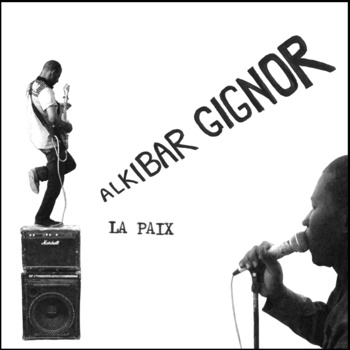Reviews May 15, 2012
La Paix
Sahel Sounds, the Mali/Portland based blog best known for releasing/curating the “Music From Saharan Cellphones” compilations in 2010, has continued its exploration of the (seemingly infinite) soundscape of West Africa with its latest release, the album “La Paix” by self-described “African garage” group Alkibar Gignor. The band is based in Niafounke, a small town best known as the hometown of the legendary Ali Farka Toure. Recorded piecemeal over a period of about two years, the album is uniformly excellent. Over its ten tracks, Alkibar Gignor offer a potent reworking of the dominant tropes of Malian music, taking its frantically circling instrumental lines, rapid-fire picking, and call and response vocal melodies, and tying them to red-lined guitars and a gallop beat that reflects the influence of modern pop music (The Sahel Sounds blog describes it “Decale drumming,” a rhythmic style derived from a wildly popular genre of African rap developed in Coite D’Ivory/Paris). The music of the past is not rejected entirely of course, and several tracks feature delicate acoustic guitars that should more than satisfy any fan of more traditional Malian music.
That said, what’s so fascinating about “La Paix”, and what makes the “African garage” tag more than just a canny marketing ploy, is less the style of the music being played than it is the style with which it is played/recorded. Eschewing the glossy production of the crossover attempt, La Paix is recorded in an astonishing variety of fidelities, with much of the album completely permeated by the distortions of the recording process. Tracks end suddenly in the middle of a song, while others begin with false notes or misplaced drumbeats. Vocals are either flat and distant or pushed to the edge of distortion, while metallically biting guitars rip through rapidly blowing amplifiers. The drums sound like deteriorating cardboard boxes. What’s more, the recording quality isn’t anything like uniform- every track seems to have been recorded under radically differing conditions, and no two sound entirely alike.
The off the cuff style of the recording is replicated by Alkibar Gignor’s playing, which delivers with the kind of attitude that only appears on the most pure-hearted garage rock records. This is a band that it isn’t about originality, instrumental perfection, or sonic attractiveness. Instead, its music sounds as if it was made as a near existential statement- this album, in its pure unvarnished existence, simply is, and the sheer vitality of that position is more than enough to justify its aesthetic impact. The overall effect provides the listener with a (seeming) shock of the real, as much audio documentation as finished product. When a song cuts off abruptly, or starts in the middle, it suggests that the music continues to live on the other side of the edit; it seems to free the song from the fixed prison of the record. The result is among the most refreshing, listenable, and exciting releases that I have heard so far this year.
To listen to the album (or buy it) go to the Sahel Sounds Bandamp HERE. And of course, you should also check out the deeply awesome Sahel Sounds Blog.
-Sam Backer









